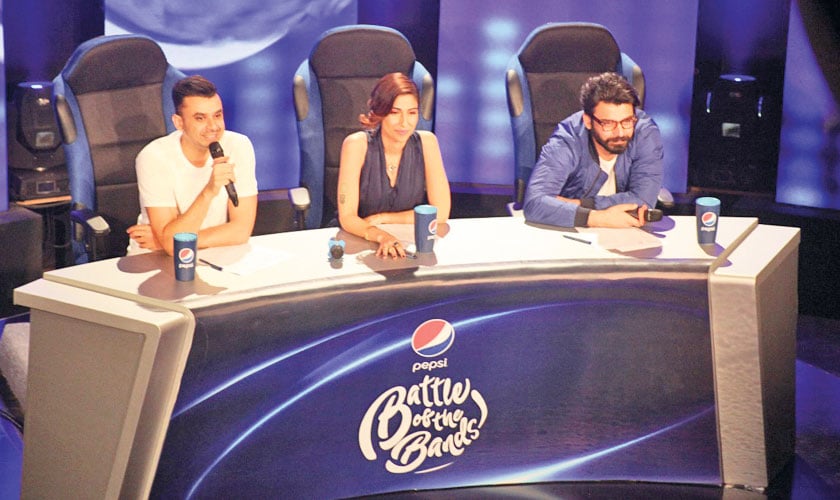Ahsan Bari gives us insight into Pepsi Battle of the Bands as the top eight bands emerge. Approaching the new season of Pepsi Battle of the Bands with skepticism, it has to be said that two episodes in, no clear favourite band has emerged. All that could change as early as next week now that the selected bands have been announced. The eight bands that have managed to make it to the main round and will compete for the top prize are Badnaam, Roots, Kashmir, Madlock, Aura, Pindi Boys, Shajr and Darvesh.
Ahsan Bari from Pepsi Battle of the Bands team explains the decisions taken by the judges panel, featuring Farooq Ahmed, Meesha Shafi and Fawad Khan.
musicmix
Ahsan Bari gives us insight into Pepsi Battle of the Bands as the top eight bands emerge.
Approaching the new season of Pepsi Battle of the Bands with skepticism, it has to be said that two episodes in, no clear favourite band has emerged. All that could change as early as next week now that the selected bands have been announced. The eight bands that have managed to make it to the main round and will compete for the top prize are Badnaam, Roots, Kashmir, Madlock, Aura, Pindi Boys, Shajr and Darvesh.
Much like the first episode, the second one brought with it a number of bands performing either an original song or a cover tune while Fawad Khan, Meesha Shafi and Farooq Ahmed (Aaroh) served on the panel of judges. Ahmed also took the stage later on with his music group and delivered a colorful version of their hit single, ‘Raag Neela’.
Most bands such as Ehl-e-Rock, Darvesh, Yoon, Badnaam and Khamaaj veered into derivative territory but at least two promising acts did manage to shine, namely E Sharp and Nafs. Both bands, however, were eliminated. Perhaps the most contested decision made by the judges so far was their rejection of the much-cherished indie music outfit, Sikandar Ka Mandar (SKM). To some it felt like an egregious oversight but as Ahsan Bari from Pepsi Battle of the Bands team explains it, the decision takes into account several factors, both overt and subliminal and SKM belong in a different, much more accomplished league.
“Sikandar Ka Mandar is a great band,” Bari told Instep. “The kind of music they’re doing is really unique. They have brought a unique element to the Pakistani music identity. But it is also a band that is beyond battles. Their focus should remain on original content. The spirit with which they came will only help them; people who don’t know about this kind of music will get exposed to it. Nadir Shehzad Khan, the lead vocalist, the way he perceives music is very interesting. It is new to a lot of people and the masses will learn about it as time goes by. It is also possible that the kind of band that Pepsi Battle of the Bands is looking for, perhaps SKM is not that outfit at this present time. The decisions are based on many factors and perhaps they don’t fit in all the criteria but my personal perspective is that SKM and E Sharp are beyond battles.”
Bari is also clear on the fact that comparison to the 2002 edition of Pepsi Battle of the Bands is unfair. “Look at the history. Back then during the inaugural edition you had bands like Junoon still performing and the industry was in good shape. You had live shows. In the last decade or so, look at what’s happened to the arts, particularly the music scene. Merit has been killed. Favouritism is promoted. I don’t want to name anyone. People who keep posting about how good or bad a certain production is need to search and learn about how professional musicians are struggling. Some are no longer professional musicians and have gone towards alternate careers. Others who are still functioning have to struggle a great deal.”

Bari notes that the music industry has sustained enormous damage in the last decade and with the absence of record labels and dedicated music channels, a show like Pepsi Battle of the Bands serves to encourage promising musicians; the criticism meted out to it must take into consideration the reality of the industry as it currently stands.

“Artists today have to do everything themselves; I salute the bands who have come on the show, not just the top eight but the top 20 bands – they are all brilliant,” he explains. “Not all will get selected but through the show - which can be found online and on TV screens - the industry will gain artists. Take Fawad Khan, he emerged through EP and is now a huge star. But EP never fixated on the fact that they were the runner-up; Mekaal Hasan Band is another example. They were not in the top two but today Hasan is one of the most recognised music producers in the country. My point is making comparisons between this production to its predecessor is unfair. We should be happy that so much music is coming out and it’s on pure merit. No one can say that these judges are not capable. These are the most capable people in the Pakistani music industry because they are pillars of the industry and the way they are judging – I can speak on it because I’ve seen them and heard their perspective – it’s really good.”